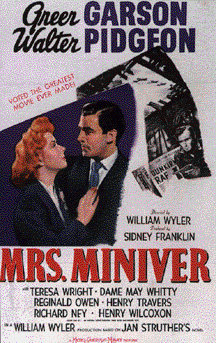
|
1942 Best Picture:
Mrs. Miniver

|
Competition:
The Forty Ninth Parallel, Kings Row, The
Magnificent Ambersons, The Pied Piper, Pride of the Yankees, Random
Harvest, Talk of the Town, Wake Island, Yankee Doodle Dandy
Other Winners:
Best Actor:
James Cagney, Yankee Doodle Dandy
Best Actress: Greer Garson,
Mrs. Miniver
Best Supporting Actor:
Van
Heflin, Johnny Eager
Best Supporting Actress: Teresa
Wright, Mrs. Miniver
Best Director: William Wyler, Mrs. Miniver
|
Cast:
Greer Garson, Walter Pidgeon, Teresa Wright, Dame May Whitty, Reginald
Owen, Henry Travers, Richard Ney
Storyline:
War
torn England is the backdrop for this film about a family who suffer the
daily hardships and horrors of the bombing raids by
Germany.
Did it deserve to
win:
I suppose it had
to! There were better films out that year, namely, The Magnificent
Ambersons (for which Agness Moorehead should have won the Best Supporting
Actress Oscar), and Yankee Doodle Dandy (for which James Cagney did win
the Best Actor Oscar).
Mrs. Miniver benefited
from good timing. The ceremony took place on March 4, 1943, at a
time when America was firmly entrenched in the war. The sentiment at the time would have definitely
swayed toward this picture. Critique:
Mrs.
Miniver is dated by today's standards. It's a patriotic weepy, with
the perfect mom, and the perfect family, forced into some not so perfect
situations. I
liked the movie, and when it comes to keeping a stiff upper lip, there is
no one better than Garson, who is at her best here. On the other
hand, the film doesn't seem to tell us anything that we don't already
know, and because of the times, I suppose, it waters down the
realities. Hope
and Glory, the 1987 British film of the same subject, was a much better
glimpse into the life of Brits back then.
|
Best Scene:
The Intruder! Greer finds a wounded
German soldier in her own backyard, and before she can do anything about
it, he is holding her captive in her home. He demands a coat and
some food. Greer is only too happy to be the gracious host, but she
underestimates his commitment to the German Nazis.
|
|
|
Behind
the Scenes: Winston Churchill
declared that Mrs. Miniver was a 'propaganda worth a thousand
battleships.' Hollywood was cashing in on the war effort big
time. Box office records hadn't been so high since before the crash
of 1929. Film
historian, Leslie Halliwell said that Mrs. Miniver 'provided a beacon of
morale despite its false sentiment, absurd rural types and melodramatic
situations. It is therefore beyond criticism, except that some of
the people involved should have known better.' Greer
Garson is credited with having given the longest acceptance speech in the
history of the Academy Awards. The next year, speech length was
capped. Legend tell of her oration being as long as twenty minutes,
but in actual fact it was only about five and a half minutes. Teresa
Wright became the second actress in history to earn a double
nomination. She was nominated for Best Actress for The Pride of the
Yankees. She lost to Greer Garson, her co-star in Mrs. Miniver.
Wright won the Best Supporting Actress award for her role in Mrs. Miniver.
|
|
|